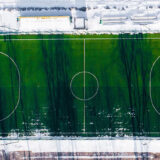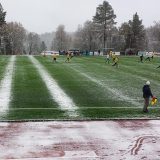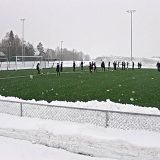Electric field heating is an effective solution for maintaining a safe outdoor playing surface year-round in locales that experience inclement weather conditions. It accomplishes this through the distribution of thermal heating from an electric grid installed below the surface. This effectively prevents the turf from freezing and stops the accumulation of ice on the playing surface. The benefits of this type of system are numerous, including cost savings, player safety, energy efficiency, and ease of use. This type of system reduces energy consumption and offers significant savings over water heating methods. And the flexibility of this type of system makes it useful for any type of facility, as it can be installed below natural or artificial turf, as well as stone, gravel, or asphalt.
Approximately 38% of the population in the U.S. lives in areas of the country that regularly experience freezing or below-freezing temperatures. Some of the most populated cities in the country are in places like Chicago, New York, Boston, Minneapolis, and Philadelphia among others. Likewise, highly populated cities in Canada, such as Toronto and Calgary, Montreal, and Vancouver also regularly experience severe inclement weather. All these cities have large, active populations that despite the cold, still are active and expect to be able to participate in the activities they enjoy. Sports facilities in these locations that have outdoor fields for soccer, football, rugby, field hockey, tennis, and lacrosse need cost-efficient, reliable, and safe field heating systems.
For many of these cold-weather locations, the freezing temperatures can last for twenty-five percent of the year. For example, in the U.S., the average low in Boston from December–March is 26°, New York, 30°, and Chicago, 27°. The Celsius drops even further in Canada, with December–March average low temperatures dropping to 23° in Toronto, and 12° in Calgary. Between snow and freezing temperatures, this type of severe weather can pose real – and costly – problems for both players and the playing surfaces. Rainwater that is not able to filter through the ground due to frozen conditions, can lead to a field being destroyed if it’s played on, not to mention the increased risk of injury. An underground electric field heating system is the optimum solution for these extreme kinds of weather conditions, keeping outdoor playing surfaces safe and playable at 25% of the cost of other methods.








